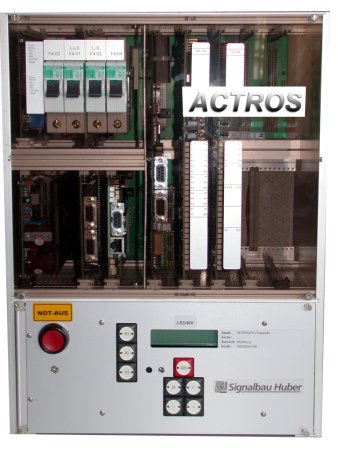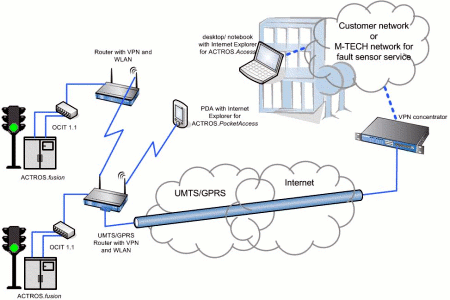Linux and real-time Java power German traffic lights
Aug 27, 2007 — by LinuxDevices Staff — from the LinuxDevices Archive — 27 views A major European vendor of city-wide traffic management systems is porting its flagship traffic light controller to Linux and real-time Java. Signalbau Huber says its Actros controller will better meet safety-critical requirements after moving to Sysgo ELinOS/PikeOS 4.1 with Aonix's PERC real-time… Java runtime.
A major European vendor of city-wide traffic management systems is porting its flagship traffic light controller to Linux and real-time Java. Signalbau Huber says its Actros controller will better meet safety-critical requirements after moving to Sysgo ELinOS/PikeOS 4.1 with Aonix's PERC real-time… Java runtime.
Currently, Signalbau Huber's Actros controller is based on Debian GNU/Linux 3.2. Versions based on the new software implementation are expected to begin testing by year's end, according to Joachim Lock, R&D engineer. “The migration will enable us to move from several different CPUs to one CPU, [while] keeping security-critical functions and Linux separated,” he explained.
Lock describes Signalbau Huber as one of Germany's two largest traffic managment system vendors. He said the company's systems are used in Frankfurt, Stuttgart, Prague, Budepest, Vienna, Poland, Warsaw, and Benelux, among other European locations.
Signalbau Huber's installations comprise one or two central traffic management systems per city. These are typical PC systems — “not so big as you might think,” Lock said — with lots of network connectivity and database-based application software. Connected to these systems by VPNs, “special networks,” dial-up modems, and even GPRS and UMTS are Linux-based Actros controllers designed for placement in each intersection.

A single Actros controller can control 196 individual signals
The Actros controller runs Linux on a single x86-compatible control-plane processor. A CAN (controller area network) backplane supports multiple switching card modules, each based on an Infineon XC164 microcontroller. The switching cards use MOSFETs (metal-oxide semiconductor field-effect transistor) to send voltages to connected signals — including pedestrian and traffic lights. With a full complement of switching cards, a single Actros controller can control 196 individual signals, Lock said.

Signalbau Huber traffic management system architecture
(Click to enlarge)
Signalbau Huber's current, Debian 3.0-based Actros controller uses an AMD SC520 “control processor” clocked at 133MHz. It also has a “security processor” that will be obviated by the new ELinOS/PERC architecture. The company has not yet finalized its choice of processors for next-generation Actros controllers, but is evaluating AMD's LX800, Lock said.
The new design's control processor will run Sysgo's ELinos 4.1 embedded Linux implementation, including PikeOS, Sysgo's real-time, POSIX-compatible execution environment add-on. The Linux component will provide a browser-based management interface accessible over the network or to on-site technicians. The real-time PikeOS environment, meanwhile, will host Aonix's PERC real-time Java component.
Two safety-critical applications will run under PERC. The first of these real-time Java applications is a traffic control program specific to each intersection, enabling engineers to program light behavior in Java. The second is an OCIT (open communication interface for road traffic control systems) networking stack that handles most communications with the central management system.
Lock said, “We need real-time because of security requirements that we have to fulfill, where the control system has to switch off with 300-millisecond response times.”
Lock said Signalbau Huber's 20 engineers are all currently working on the migration, with some help from Sysgo. “They are doing some consulting for us [related to] the special features of ELinOS,” he said.
Lock said that after an initial period of evaluation, Signalbau Huber has been working on the migration to ELinOS/PERC for about half a year. “We are close to the first milestone. At the beginning of next year I expect there to be some test systems on the street.”
Lock added. “By choosing Linux, we are prepared for the future. It's a flexible and scalable system.”
This article was originally published on LinuxDevices.com and has been donated to the open source community by QuinStreet Inc. Please visit LinuxToday.com for up-to-date news and articles about Linux and open source.